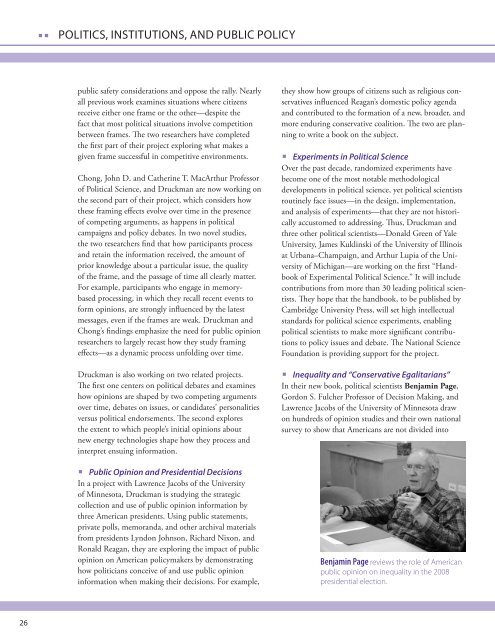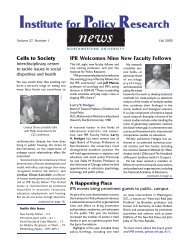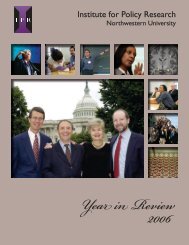IPR - Institute for Policy Research - Northwestern University
IPR - Institute for Policy Research - Northwestern University
IPR - Institute for Policy Research - Northwestern University
Create successful ePaper yourself
Turn your PDF publications into a flip-book with our unique Google optimized e-Paper software.
Politics, Institutions, and Public <strong>Policy</strong><br />
public safety considerations and oppose the rally. Nearly<br />
all previous work examines situations where citizens<br />
receive either one frame or the other—despite the<br />
fact that most political situations involve competition<br />
between frames. The two researchers have completed<br />
the first part of their project exploring what makes a<br />
given frame successful in competitive environments.<br />
Chong, John D. and Catherine T. MacArthur Professor<br />
of Political Science, and Druckman are now working on<br />
the second part of their project, which considers how<br />
these framing effects evolve over time in the presence<br />
of competing arguments, as happens in political<br />
campaigns and policy debates. In two novel studies,<br />
the two researchers find that how participants process<br />
and retain the in<strong>for</strong>mation received, the amount of<br />
prior knowledge about a particular issue, the quality<br />
of the frame, and the passage of time all clearly matter.<br />
For example, participants who engage in memorybased<br />
processing, in which they recall recent events to<br />
<strong>for</strong>m opinions, are strongly influenced by the latest<br />
messages, even if the frames are weak. Druckman and<br />
Chong’s findings emphasize the need <strong>for</strong> public opinion<br />
researchers to largely recast how they study framing<br />
effects—as a dynamic process unfolding over time.<br />
Druckman is also working on two related projects.<br />
The first one centers on political debates and examines<br />
how opinions are shaped by two competing arguments<br />
over time, debates on issues, or candidates’ personalities<br />
versus political endorsements. The second explores<br />
the extent to which people’s initial opinions about<br />
new energy technologies shape how they process and<br />
interpret ensuing in<strong>for</strong>mation.<br />
< Public Opinion and Presidential Decisions<br />
In a project with Lawrence Jacobs of the <strong>University</strong><br />
of Minnesota, Druckman is studying the strategic<br />
collection and use of public opinion in<strong>for</strong>mation by<br />
three American presidents. Using public statements,<br />
private polls, memoranda, and other archival materials<br />
from presidents Lyndon Johnson, Richard Nixon, and<br />
Ronald Reagan, they are exploring the impact of public<br />
opinion on American policymakers by demonstrating<br />
how politicians conceive of and use public opinion<br />
in<strong>for</strong>mation when making their decisions. For example,<br />
they show how groups of citizens such as religious conservatives<br />
influenced Reagan’s domestic policy agenda<br />
and contributed to the <strong>for</strong>mation of a new, broader, and<br />
more enduring conservative coalition. The two are planning<br />
to write a book on the subject.<br />
< Experiments in Political Science<br />
Over the past decade, randomized experiments have<br />
become one of the most notable methodological<br />
developments in political science, yet political scientists<br />
routinely face issues—in the design, implementation,<br />
and analysis of experiments—that they are not historically<br />
accustomed to addressing. Thus, Druckman and<br />
three other political scientists—Donald Green of Yale<br />
<strong>University</strong>, James Kuklinski of the <strong>University</strong> of Illinois<br />
at Urbana–Champaign, and Arthur Lupia of the <strong>University</strong><br />
of Michigan—are working on the first “Handbook<br />
of Experimental Political Science.” It will include<br />
contributions from more than 30 leading political scientists.<br />
They hope that the handbook, to be published by<br />
Cambridge <strong>University</strong> Press, will set high intellectual<br />
standards <strong>for</strong> political science experiments, enabling<br />
political scientists to make more significant contributions<br />
to policy issues and debate. The National Science<br />
Foundation is providing support <strong>for</strong> the project.<br />
< Inequality and “Conservative Egalitarians”<br />
In their new book, political scientists Benjamin Page,<br />
Gordon S. Fulcher Professor of Decision Making, and<br />
Lawrence Jacobs of the <strong>University</strong> of Minnesota draw<br />
on hundreds of opinion studies and their own national<br />
survey to show that Americans are not divided into<br />
Benjamin Page reviews the role of American<br />
public opinion on inequality in the 2008<br />
presidential election.<br />
26
















